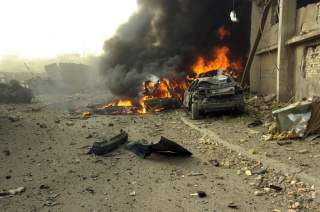The ISIS Paradox: A Mirage or Mortal Threat?
While the group has made significant gains over its adversaries, and controls large swaths of strategic territory in Iraq and Syria, it is beset by several internal contradictions and vulnerabilities.
Moreover, it is likely that ISIS will be challenged by the region’s major powers, such as Iran, Saudi Arabia, and possibly even Turkey. And there seems to be evidence that these efforts will be augmented, at least indirectly, by the United States and even Russia, which has its own Islamic problems. It is unlikely that ISIS, whose proven strengths have been the ability to capture territory from weak states using a combination of terrorist and insurgency methods, could withstand a military onslaught that might come from a concerted effort by the major powers in the region.
If so much of what ISIS claims and represents happens to be a mirage, riddled with internal contradictions, why is a strategy needed for confronting it? In other words, if it is likely to eventually tear itself apart, why do anything?
First of all, remember that ISIS represents a paradox in that it embodies real strengths, but also significant weaknesses. And right now it is playing to its strengths. It controls large swaths of Syria, much of Anbar Province in Iraq and Mosul, Iraq’s second largest city, and many border crossings between Iraq and Syria and Iraq and Jordan. To reinforce ISIS’s weaknesses, internal forces in Syria and Iraq need to be mobilized against it. But because of the civil war in these countries, these internal forces need to be supported by outside powers, particularly by those countries which have the most to lose by an expanding ISIS regional footprint, namely Iran, Saudi Arabia and Turkey. In other words, while ISIS may implode on its own in the long term, a strategic response is needed in the short and medium term to roll it back and blunt its expansion.
Second of all, strategic actions are required to challenge the ideological and legitimacy vacuum, particularly in Syria and Iraq, that ISIS feeds upon. ISIS thrives because of the absence of a political horizon for millions of victims of civil war, and because of the disenfranchisement of Sunni tribes and groups in both Iraq and Syria. If the civil war in Syria grinds on further and millions of its citizens continue to experience nothing but hopelessness, it is possible that ISIS will be able to consolidate its support, despite the fact that it provides no real enduring foundation for political community. It is imperative that the major powers in the region, particularly Iran and Saudi Arabia, both of which have fanned the flames of the civil wars in Syria and Iraq, now get together to help rollback ISIS and make sure that it doesn’t further metastasize in the region.
The question is what is the appropriate role for the United States in the battle against ISIS? While it can offer some equipment, training and intelligence support to the Iraqi government, the United States should refrain from directly entering the fray, lest it get mired in two civil wars and perhaps even make matters worse for the citizens of Iraq and Syria. But it should step up to the plate and play the role of convener of status to bring the major regional powers, and perhaps even international powers like Russia, together to try to get them to work with one another, as opposed to against one another via proxy war, to quiet the conflicts in Syria and Iraq. While Saudi Arabia and Iran are already mounting cooperative efforts to contain ISIS and play a more constructive role in Syria and Iraq, the United States has the capacity to encourage, coordinate, and cajole these two historic adversaries towards a more integrated strategy than they might undertake on their own. The United States also could use its considerable public diplomacy and technological capabilities to try to counter much of the propaganda spread by ISIS through the social media.
Without U.S. involvement, it is possible that ISIS will prove itself to be a mirage and collapse on its own or through the efforts of the regional powers. But the United States can’t afford to take the risk that ISIS could potentially change the political landscape in the region permanently, and prove that it is more of a reality than a mirage. While the United States should be circumspect about direct involvement, it should use the powers it does have to convene, cajole and persuade, to help the regional powers defeat ISIS and ensure sure that it and groups of its ilk don’t fill the vacuum left by the civil wars in Syria and Iraq.
Ross Harrison is on the faculty of the Walsh School of Foreign Service at Georgetown University, where he teaches strategy. He also teaches Middle East politics at the University of Pittsburgh, and is a frequent contributor of articles on strategic issues facing the Middle East. He is the author of Strategic Thinking in 3D: A Guide for National Security, Foreign policy and Business Professionals (Potomac Books: 2013)
Michael W. S. Ryan, a senior fellow at the Jamestown Foundation and an adjunct scholar at the Middle East Institute, studied Arabic in Egypt and received his Ph.D. from Harvard University. He served as a senior executive in the U.S. Departments of State and Defense and as vice president of the Millennium Challenge Corporation and the Middle East Institute. He is the author of Decoding al-Qaeda’s Strategy: The Deep Battle Against America (Columbia University Press: 2013)

